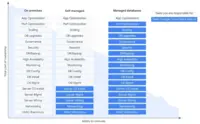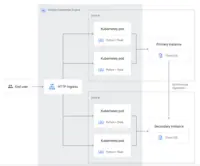Overview
What is Google Cloud SQL?
Google Cloud SQL is a database-as-a-service (DBaaS) with the capability and functionality of MySQL.
Awards
Products that are considered exceptional by their customers based on a variety of criteria win TrustRadius awards. Learn more about the types of TrustRadius awards to make the best purchase decision. More about TrustRadius Awards
Popular Features
- Automated backups (23)9.494%
- Database security provisions (23)9.292%
- Database scalability (23)9.090%
- Monitoring and metrics (22)8.686%
Reviewer Pros & Cons
Pricing
License - Express
$0
License - Web
$0.01134
Storage - for backups
$.08
Entry-level set up fee?
- No setup fee
Offerings
- Free Trial
- Free/Freemium Version
- Premium Consulting/Integration Services
Product Demos
Choosing a PostgreSQL database on Google Cloud
Database Configurations with Google Cloud SQL
Connecting Google Sheets to Cloud SQL using Apps Script
Features
Product Details
- About
- Competitors
- Tech Details
- FAQs
What is Google Cloud SQL?
Fully managed
Cloud SQL automates backups, replication, patches, encryption, and storage capacity.
Open and standards-based
Cloud SQL supports the most popular open source and commercial engines, including MySQL, PostgreSQL, and SQL Server with support for extensions, configuration flags, and popular developer tools. The user can create a database with a few clicks in the console and connect an application.
Cost-effectiveness
Users can scale with application growth, customize machine types, and choose different levels of performance and availability, up to a 99.99% availability SLA. Committed use discounts offer additional savings for one to three year commitments.
Intelligent insights and manageability
Gemini in Databases
AI-powered assistance is included to simplify database management. Gemini in Cloud SQL, in preview, enables developers, operators, and database administrators to build applications quickly using natural language, and helps manage, optimize, and govern an entire fleet of databases with a single pane of glass.
Google Cloud SQL Features
Database-as-a-Service Features
- Supported: Database scalability
- Supported: Automated backups
- Supported: Database security provisions
- Supported: Monitoring and metrics
Google Cloud SQL Screenshots
Google Cloud SQL Videos
Google Cloud SQL Competitors
Google Cloud SQL Technical Details
| Deployment Types | Software as a Service (SaaS), Cloud, or Web-Based |
|---|---|
| Operating Systems | Unspecified |
| Mobile Application | No |









